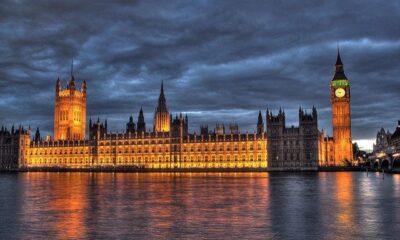

Economy
Campaigners Claim New Boundaries Will ‘Skew Our Democracy’
The Electoral Reform Society has stated that constituency boundaries should be drawn on the basis of population rather than an incomplete electoral register.
On the day that the Boundary Commission released its provisional proposals for redrawing constituencies, the ERS has found that both London and the South East are missing two constituencies each as a result of over 2 million registered voters not being counted.
Seats in Boundary Commission 2018 review (under December 2015 register) | Seats if review had used June 2016 register | Change | |
Total | 600 | 600 | 0 |
England | 501 | 502 | 1 |
Scotland | 53 | 53 | 0 |
Wales | 29 | 29 | 0 |
Northern Ireland | 17 | 16 | -1 |
Eastern | 57 | 56 | -1 |
East Midlands | 44 | 43 | -1 |
London | 68 | 70 | 2 |
North East | 25 | 25 | 0 |
North West | 68 | 67 | -1 |
South East | 83 | 85 | 2 |
South West | 53 | 53 | 0 |
West Midlands | 53 | 53 | 0 |
Yorkshire and the Humber | 50 | 50 | 0 |
Source: Electoral Reform Society analysis of Electoral Commission data
Looking at the ten areas where there has been the biggest increase in the electoral register between December 2015 and June 2016, five are in London (with four of these in the top five).
Local Counting Area | Provisional Referendum Electorate | 1 December 2015 Parliamentary Electorate | % Change from December 2015 | Absolute Change |
Lewisham | 197,514 | 166,489 | 18.6% | 31025 |
Lambeth | 210,766 | 187,581 | 12.4% | 23185 |
Camden | 145,328 | 129,475 | 12.2% | 15853 |
Tower Hamlets | 167,789 | 150,351 | 11.6% | 17438 |
Cambridge | 80,099 | 72,457 | 10.5% | 7642 |
Hackney | 163,284 | 147,877 | 10.4% | 15407 |
Lincoln | 63,336 | 57,397 | 10.3% | 5939 |
Oxford | 97,309 | 88,382 | 10.1% | 8927 |
Slough | 87,868 | 79,826 | 10.1% | 8042 |
Canterbury | 109,399 | 99,849 | 9.6% | 9550 |
Source: Electoral Reform Society analysis of Electoral Commission data
Commenting on the Boundary Commission’s provisional proposals for redrawing constituencies, Katie Ghose, Chief Executive of the Electoral Reform Society, said:
“The fact that this boundary review is being conducted on the basis of registered electors, rather than the actual population, risks skewing our democracy.
“Areas with the lowest levels of registration are often those that already have the least voice in politics. Young people, some ethnic minority groups and those in the private rented sector are all less likely to register to vote than others. That makes many of them effectively cut out of the new political map.
“What’s more, the review is being undertaken on the basis of a register that’s nearly a year out of date, excluding over two million people who signed up between December and June. That means some regions are two seats short of what they are owed.
It would be much fairer to draw boundaries based on eligible population rather than an incomplete electoral register.
‘Equalising’ constituencies
“Fair political boundaries are crucial to ensuring people are properly represented in Parliament. But we shouldn’t tear apart close-knit areas in a rush to ‘equalise’ numbers.
“The rigid 5% threshold – the maximum difference in size between constituencies – poses the prospect of huge disruption every five years through sparking a boundary review for every election. And it’s far too inflexible to take into account natural borders between different communities.”
A smaller commons – but a larger Lords
“Cutting the number of MPs is the wrong priority. We have a growing unelected House and a shrinking elected one. The House of Lords is a super-sized second chamber – second only to China – and shockingly poor value for money. Surely it would be more democratic to address the crisis in the House of Lords than to cut the number of elected MPs.
Power imbalance
“If you reduce the number of MPs in Parliament without reducing the number of ministers, you increase the power of the executive and make it more difficult to challenge the government. That will reduce the ability for Parliament to do its job of holding the Government to account.”
Making votes count
“The government talks about the need to ‘make every vote count’ through these changes. Yet the best way to do that – the elephant in the room – is the need for a proportional and fair voting system.
“If the government really cares about making votes matter, they should concentrate on reforming the voting system.”


 Environment12 months ago
Environment12 months agoAre Polymer Banknotes: an Eco-Friendly Trend or a Groundswell?

 Features11 months ago
Features11 months agoEco-Friendly Cryptocurrencies: Sustainable Investment Choices

 Features12 months ago
Features12 months agoEco-Friendly Crypto Traders Must Find the Right Exchange

 Energy11 months ago
Energy11 months agoThe Growing Role of Solar Panels in Ireland’s Energy Future





























